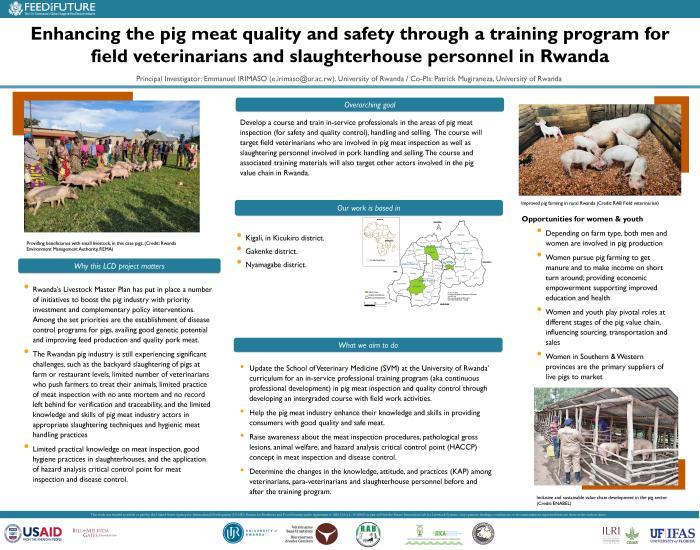Enhancing the Pig Meat Quality and Safety Through a Training Program for Field Veterinarians and Slaughterhouse Personnel in Rwanda
- Research Project Location: Rwanda
- Timeframe: April 2024 - June 2025 (Terminated in February 2025)
- Funding: USAID
Introduction
Rwanda’s Livestock Master Plan has put in place several initiatives to boost the pig industry with priority investment and complementary policy interventions. Among the set priorities are the establishment of disease control programs for pigs, availing good genetic potential and improving feed production and quality pork meat.
However, the Rwandan pig industry is still experiencing significant challenges, such as the backyard slaughtering of pigs at farm or restaurant levels, limited number of veterinarians who push farmers to treat their animals, limited practice of meat inspection, and the limited knowledge and skills of pig meat industry actors in appropriate slaughtering techniques and hygienic meat handling practices.
Project Goal and Objectives
Develop a course and train in-service professionals in pig meat inspection (for safety and quality control), handling, and selling. The course targeted field veterinarians who are involved in pig meat inspection, slaughtering personnel involved in pork handling and selling as well as other actors involved in the pig value chain in Rwanda.
The objectives of the project were to:
- Update the School of Veterinary Medicine (SVM) at the University of Rwanda’ curriculum for an in-service professional training program (continuous professional development) in pig meat inspection and quality control through developing an intergraded course with field work activities.
- Support the pig meat industry to enhance their knowledge and skills in providing consumers with good quality and safe meat.
- Raise awareness about the meat inspection procedures, pathological gross lesions, animal welfare, and hazard analysis critical control point (HACCP) concept in meat inspection and disease control.
- Determine the changes in the knowledge, attitude, and practices (KAP) among veterinarians, para-veterinarians and slaughterhouse personnel before and after the training program.
Research Approach
The project started with an inception meeting and a baseline survey to identify challenges and understand the level of KAP that professionals working in the pig value chain have on meat inspection procedures, hygiene, safety, HACCP, and disease prevention and control. The project will update the SVM's curriculum with short courses on food safety and biosecurity and co-develop course materials with academic staff integrated into the existing curriculum.
Some of the project's activities include running a training of trainers (TOT) workshop for selected veterinarians, para-veterinarians, and slaughterhouse personnel and hosting meetings with stakeholders of the pig value chain to disseminate knowledge products, including course materials, learnings from the cascading workshops, and KAP findings which will be published in a peer-reviewed journal.
Part of the project will complement activities of the Livestock Systems Innovation Lab Reach project titled “Profiting from Pigs in Rwanda: Improving people’s lives and livelihoods through more productive pig farming.”
Principal Investigator (PI) and Lead Institution

Emmanuel Irimaso, University of Rwanda
Co-Principal Investigator
Patrick Muginareza, University of Rwanda
Additional Collaborators
- Veterinarians Without Borders / Vétérinaires sans Frontières
- Rwanda Inspectorate, Competition and Consumer Protection Authority
- Rwanda Pig Farmers Association
- Rwanda Agriculture and Animal Resources Development Board
Resources






